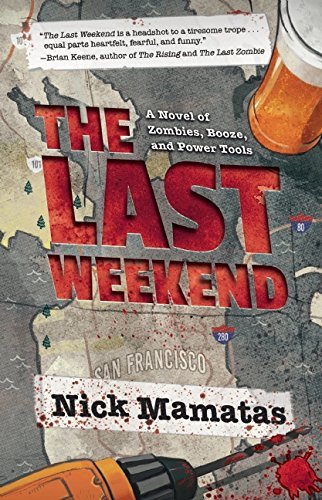LOCUS review of THE LAST WEEKEND from 2014
Back when
The Last Weekend
was a pricey UK import, Tim Pratt reviewed it for the August 2014 issue of Locus. Since is the book is out in the US now, I asked Tim for the review, and here it is!
The Last Weekend, Tim Pratt:
When I encounter a zombie novel these days, I tend to shamble in the other direction as fast as possible. It’s not that I don’t like the mindless undead, whether they’re fast, slow, viral, or supernatural – they’ve just become too common in recent years, so ubiquitous in games, cinema, comics, and literature that they form an undifferentiated horde, often of mediocre or worse quality. The right author can tempt me away from my no-more-zombies stance, though – Daryl Gregory did it a few years ago with Raising Stony Mayhall, and now Nick Mamatas has done it with The Last Weekend .

Narrator Vasilis ‘‘Billy’’ Kostopolis is the son of Greek immigrants, an aspiring writer with destructive taste in women and booze. Misadventures and bad life choices lead him from college in Youngstown OH to San Francisco, where he drinks and tries to write, carrying around a printout of his one published story, impressing no one. He drunkenly sleeps through the beginning of the end of the world: a zombie apocalypse, but one that only takes place within the borders of the continental United States. He’s awakened by soldiers bursting into his apartment demanding he recite the alphabet, and once he proves he’s not the living dead (at least, not the flesh-eating kind), a social worker fills him in: the dead have risen across the country, and chaos reigns. Local governments are doing their best to hold on, but things are dire.
Except, in San Francisco, it’s not that bad. The city famously lacks graveyards – almost all the cemeteries were relocated elsewhere long ago – and since these zombies are of the slowly shambling variety, the city’s hilly terrain keeps them from getting around too easily. The city is a character here, and Mamatas depicts it well – though I don’t think I’d sign up for The Last Weekend walking tour if one were offered.
Even with the advantages of San Francisco geography, plenty of people die in the initial uprising, and most of those who are left behind are a lot like Billy: outsiders, loners, and rugged (or ragged) individualists. Those with close families tend to die quickly, after all, spending too much time hoping Mom isn’t really a murderous monster and not enough time bashing her brains out.
Billy takes a job with the city, working as a driller: he’s given a portable power drill and a phone, and after that, he’s on call. If a survivor in the city sees a newly dead or dying person, be they family or neighbor or friend, Billy gets a call. His job is to drill a hole in the dead person’s brain before they can rise as a zombie – messy, imprecise, ugly work, which brings him into contact with the desperate, the grieving, and the deranged. This wouldn’t be a Mamatas novel without a revolutionary streak, and Billy falls in with a group of agitators and activists determined to figure out the cause of the zombie uprising, with various competing conspiracy theories, and the idea that there might be secrets locked away in the basement of City Hall. Billy can’t be called an activist himself – he just likes dangerous women and makes poor decisions when he’s drunk, which is usually – but he stumbles on revelations nonetheless.
Mamatas has always shown a deft hand at appropriating genre tropes and twisting them to his own unusual ends, from the ghosts of Northern Gothic, to the parallel worlds of Bullettime, to the manipulative hive-mind of Sensation. He’s also adept at literary mash-ups, having in the past combined the sensibilities of the Beat writers, Hunter S. Thompson, David Foster Wallace, and even Raymond Carver with supernatural elements, usually Lovecraftian. This time, his chosen literary inspiration is the misanthropic, alcoholic, autobiographical barfly writer – Charles Bukowski will leap immediately to mind, but John Fante’s novel of life in Los Angeles, Ask the Dust, is an obvious influence, too. Still, if the tagline ‘‘Like a zombie novel written by Bukowski’’ appeals to you, this book delivers everything that summation promises. If you want a story where resourceful heroes fight to save humankind in the face of the ravenous dead, and the human spirit triumphs, I hear good things about that Brad Pitt movie loosely inspired by Max Brooks’s World War Z. But if you’d prefer dark humor, a streak of philosophical hopelessness, disastrous romance, and a resigned shrug in the face of metaphysical horror, pour yourself a drink and pick up The Last Weekend instead.
The Last Weekend, Tim Pratt:
When I encounter a zombie novel these days, I tend to shamble in the other direction as fast as possible. It’s not that I don’t like the mindless undead, whether they’re fast, slow, viral, or supernatural – they’ve just become too common in recent years, so ubiquitous in games, cinema, comics, and literature that they form an undifferentiated horde, often of mediocre or worse quality. The right author can tempt me away from my no-more-zombies stance, though – Daryl Gregory did it a few years ago with Raising Stony Mayhall, and now Nick Mamatas has done it with The Last Weekend .

Narrator Vasilis ‘‘Billy’’ Kostopolis is the son of Greek immigrants, an aspiring writer with destructive taste in women and booze. Misadventures and bad life choices lead him from college in Youngstown OH to San Francisco, where he drinks and tries to write, carrying around a printout of his one published story, impressing no one. He drunkenly sleeps through the beginning of the end of the world: a zombie apocalypse, but one that only takes place within the borders of the continental United States. He’s awakened by soldiers bursting into his apartment demanding he recite the alphabet, and once he proves he’s not the living dead (at least, not the flesh-eating kind), a social worker fills him in: the dead have risen across the country, and chaos reigns. Local governments are doing their best to hold on, but things are dire.
Except, in San Francisco, it’s not that bad. The city famously lacks graveyards – almost all the cemeteries were relocated elsewhere long ago – and since these zombies are of the slowly shambling variety, the city’s hilly terrain keeps them from getting around too easily. The city is a character here, and Mamatas depicts it well – though I don’t think I’d sign up for The Last Weekend walking tour if one were offered.
Even with the advantages of San Francisco geography, plenty of people die in the initial uprising, and most of those who are left behind are a lot like Billy: outsiders, loners, and rugged (or ragged) individualists. Those with close families tend to die quickly, after all, spending too much time hoping Mom isn’t really a murderous monster and not enough time bashing her brains out.
Billy takes a job with the city, working as a driller: he’s given a portable power drill and a phone, and after that, he’s on call. If a survivor in the city sees a newly dead or dying person, be they family or neighbor or friend, Billy gets a call. His job is to drill a hole in the dead person’s brain before they can rise as a zombie – messy, imprecise, ugly work, which brings him into contact with the desperate, the grieving, and the deranged. This wouldn’t be a Mamatas novel without a revolutionary streak, and Billy falls in with a group of agitators and activists determined to figure out the cause of the zombie uprising, with various competing conspiracy theories, and the idea that there might be secrets locked away in the basement of City Hall. Billy can’t be called an activist himself – he just likes dangerous women and makes poor decisions when he’s drunk, which is usually – but he stumbles on revelations nonetheless.
Mamatas has always shown a deft hand at appropriating genre tropes and twisting them to his own unusual ends, from the ghosts of Northern Gothic, to the parallel worlds of Bullettime, to the manipulative hive-mind of Sensation. He’s also adept at literary mash-ups, having in the past combined the sensibilities of the Beat writers, Hunter S. Thompson, David Foster Wallace, and even Raymond Carver with supernatural elements, usually Lovecraftian. This time, his chosen literary inspiration is the misanthropic, alcoholic, autobiographical barfly writer – Charles Bukowski will leap immediately to mind, but John Fante’s novel of life in Los Angeles, Ask the Dust, is an obvious influence, too. Still, if the tagline ‘‘Like a zombie novel written by Bukowski’’ appeals to you, this book delivers everything that summation promises. If you want a story where resourceful heroes fight to save humankind in the face of the ravenous dead, and the human spirit triumphs, I hear good things about that Brad Pitt movie loosely inspired by Max Brooks’s World War Z. But if you’d prefer dark humor, a streak of philosophical hopelessness, disastrous romance, and a resigned shrug in the face of metaphysical horror, pour yourself a drink and pick up The Last Weekend instead.
Published on January 13, 2016 14:29
No comments have been added yet.
Nick Mamatas's Blog
- Nick Mamatas's profile
- 244 followers
Nick Mamatas isn't a Goodreads Author
(yet),
but they
do have a blog,
so here are some recent posts imported from
their feed.



